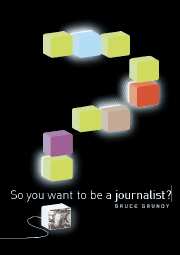Book contents
- Frontmatter
- Contents
- Acknowledgments
- Introduction
- Part 1 Getting started in journalism
- Part 2 Writing skills
- 5 Grammar
- 6 Spelling and punctuation
- 7 Subbing
- 8 Basic newspaper layout and design
- Part 3 Understanding the law
- Part 4 Research skills
- Part 5 Being professional in journalism
- Bibliography
- Further reading
- Index
7 - Subbing
Published online by Cambridge University Press: 05 June 2012
- Frontmatter
- Contents
- Acknowledgments
- Introduction
- Part 1 Getting started in journalism
- Part 2 Writing skills
- 5 Grammar
- 6 Spelling and punctuation
- 7 Subbing
- 8 Basic newspaper layout and design
- Part 3 Understanding the law
- Part 4 Research skills
- Part 5 Being professional in journalism
- Bibliography
- Further reading
- Index
Summary
The jobs and responsibilities of the subeditor are many.
In a newspaper, for example, they include: making stories fit the allocated space; pulling together several related stories into one; ensuring the structure of the stories is right; checking and correcting the spelling, punctuation and grammar; ensuring the facts are right; writing headlines and subheads; writing captions (if they have not been written by others); and checking that material is not likely to be defamatory. Someone has to do a design for the page as well (within the constraints of the space available, since the advertisements will already have been marked out).
Subs and line-up subs in radio and television have similar tasks but obviously there are differences because the delivery media involved are different. But their responsibilities are no less. Subs do a very important job and it follows they are very important people if they do their job well.
Their importance is no better illustrated than in the memo below – which “fell off the back of a truck” at work one day. The points made by the editor who wrote this memo indicate just how important subs are.
ALL EDITORIAL STAFF
Sloppy captions are again proving expensive. But also, and more importantly, affect the credibility of our paper. Poor spelling of a name disappoints a reader. The wrong name can be vastly more expensive …
Remember some lobby groups lie even more than politicians. […]
- Type
- Chapter
- Information
- So You Want To Be A Journalist? , pp. 171 - 196Publisher: Cambridge University PressPrint publication year: 2007



